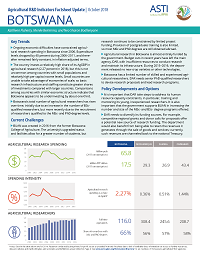Authors:
Kathleen Flaherty, Nienke Beintema, and Neo Sharon Bodilenyane
Year:
2018
Publisher
International Food Policy Research Institute and Department of Research
Back to:
BACKGROUND AND KEY TRENDS
- Ongoing economic difficulties have constrained agricultural research spending in Botswana since 2006. Expenditure levels dropped by 40 percent during 2006–2011, and thereafter remained fairly constant, in inflation-adjusted terms.
- The country invests a relatively high share of its AgGDP in agricultural research (2.27 percent in 2016), but this is not uncommon among countries with small populations and relatively high per capita income levels. Small countries are unable to take advantage of economies of scale, so basic research infrastructure and staffing constitute greater shares of investments compared with larger countries. Comparisons among countries with similar economic structure indicate that Botswana appears to be underinvesting by about one-third.
- Botswana’s total number of agricultural researchers has risen over time, initially due to an increase in the number of BSc-qualified researchers, but more recently due to the recruitment of researchers qualified to the MSc- and PhD-degree levels.
CURRENT CHALLENGES
- BUAN was created in 2016 from the former Botswana College of Agriculture. The university’s upgraded status and facilities allow for a greater number of students, but research continues to be constrained by limited project funding. Provision of postgraduate training is also limited, so most MSc and PhD degrees are still obtained abroad.
- Agricultural research in Botswana is almost entirely funded by the government. Budget cuts in recent years have left the main agency, DAR, with insufficient resources to conduct research and maintain its infrastructure. During 2015–2016, the department released no new crop varieties or other technologies.
- Botswana has a limited number of skilled and experienced agricultural researchers. DAR needs senior PhD-qualified researchers to devise research proposals and lead research programs.
POLICY OPTIONS
- It is important that DAR take steps to address its human resource capacity constraints, in particular, training and mentoring its young, inexperienced researchers. It is also important that the government supports BUAN in increasing the number and size of the MSc- and BSc- degree programs offered.
- DAR needs to diversify its funding sources. For example, competitive regional grants and donor calls for proposals offer a potential new source of research funding. The department would also benefit from being able to retain the revenues it generates through the sale of goods and services; currently, such revenues are channeled back to the national Treasury.

